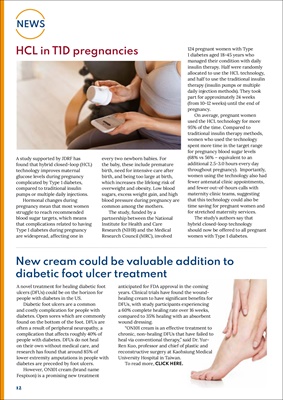
12
NEWS
HCL in T1D pregnancies
A study supported by JDRF has
found that hybrid closed-loop (HCL)
technology improves maternal
glucose levels during pregnancy
complicated by Type 1 diabetes,
compared to traditional insulin
pumps or multiple daily injections.
Hormonal changes during
pregnancy mean that most women
struggle to reach recommended
blood sugar targets, which means
that complications related to having
Type 1 diabetes during pregnancy
are widespread, affecting one in
every two newborn babies. For
the baby, these include premature
birth, need for intensive care after
birth, and being too large at birth,
which increases the lifelong risk of
overweight and obesity. Low blood
sugars, excess weight gain, and high
blood pressure during pregnancy are
common among the mothers.
The study, funded by a
partnership between the National
Institute for Health and Care
Research (NIHR) and the Medical
Research Council (MRC), involved
124 pregnant women with Type
1 diabetes aged 18-45 years who
managed their condition with daily
insulin therapy. Half were randomly
allocated to use the HCL technology,
and half to use the traditional insulin
therapy (insulin pumps or multiple
daily injection methods). They took
part for approximately 24 weeks
(from 10-12 weeks) until the end of
pregnancy.
On average, pregnant women
used the HCL technology for more
95% of the time. Compared to
traditional insulin therapy methods,
women who used the technology
spent more time in the target range
for pregnancy blood sugar levels
(68% vs 56% - equivalent to an
additional 2.5-3.0 hours every day
throughout pregnancy). Importantly,
women using the technology also had
fewer antenatal clinic appointments,
and fewer out-of-hours calls with
maternity clinic teams, suggesting
that this technology could also be
time saving for pregnant women and
for stretched maternity services.
The study's authors say that
hybrid closed-loop technology
should now be offered to all pregnant
women with Type 1 diabetes.
New cream could be valuable addition to
diabetic foot ulcer treatment
A novel treatment for healing diabetic foot
ulcers (DFUs) could be on the horizon for
people with diabetes in the US.
Diabetic foot ulcers are a common
and costly complication for people with
diabetes. Open sores which are commonly
found on the bottom of the foot. DFUs are
often a result of peripheral neuropathy, a
complication that affects roughly 40% of
people with diabetes. DFUs do not heal
on their own without medical care, and
research has found that around 85% of
lower extremity amputations in people with
diabetes are preceded by foot ulcers.
However, ON101 cream (brand name
Fespixon) is a promising new treatment
anticipated for FDA approval in the coming
years. Clinical trials have found the woundhealing
cream to have significant benefits for
DFUs, with study participants experiencing
a 60% complete healing rate over 16 weeks,
compared to 35% healing with an absorbent
wound dressing.
"ON101 cream is an effective treatment to
chronic, non-healing DFUs that have failed to
heal via conventional therapy," said Dr. YurRen
Kuo, professor and chief of plastic and
reconstructive surgery at Kaohsiung Medical
University Hospital in Taiwan.
To read more, CLICK HERE.